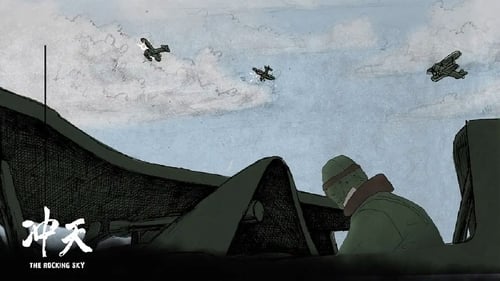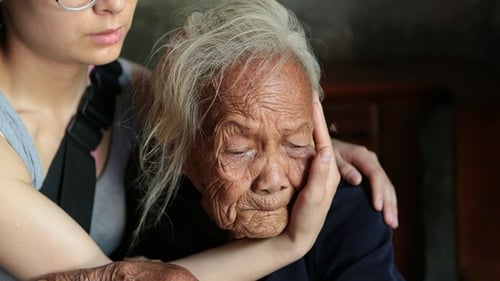YUMEN (2013)
Genre : Documentary, Drama
Runtime : 1H 5M
Director : J.P. Sniadecki, Xu Ruotao, Huang Xiang
Synopsis
Set in a quasi-ghost town that once thrived with oil in China's arid northwest, Yumen is a haunting, fragmented tale of hungry souls, restless youth, a wandering artist and a lonely woman, all searching for human connection among the town's crumbling landscape. One part "ruin porn", one part "ghost story”, and entirely shot on 16mm, the film brings together performance art, narrative gesture, and social realism not only to play with convention and defy genre, but also to pay homage to a disappearing life-world and a fading medium.

Filmed over three years on China’s railways, The Iron Ministry traces the vast interiors of a country on the move: flesh and metal, clangs and squeals, light and dark, and language and gesture. Scores of rail journeys come together into one, capturing the thrills and anxieties of social and technological transformation. The Iron Ministry immerses audiences in fleeting relationships and uneasy encounters between humans and machines on what will soon be the world’s largest railway network.

"China Gate" tells the story of young Chinese fight to change their fate through studying. Right before dawn, students in Huining have already started their self-studying session; hard working youngsters have filled up the space of school ground. This is one of the most poverty-stricken Counties in Western China; here people's only hope is in education, as the way to change their social status. Therefore all their effort point towards the College Entrance Examination, the process is like going through a gate, those who pass can study at urban Universities, and have the chance to build a better life. During the same winter season in Beijing, a graduate student faces a big decision. Should he keep trying to survive in the big city or get back to his countryside home? The exhausted faces at the Beijing underground seem to be revealing the truth about their distance in between. The student comes to see the flag ceremony at Tiananmen Square, where the pulsing symbol of the nation lies.

The movie follows two unfortunate secret lovers who are constantly looking for a solution to their situation. Both of them are always arguing over their relationship. One day they went to a trip out of the city, into the outskirt. They hope they can solve their problems or at least escape them temporarily. They don’t have a solution, and they don’t understand why they are together. One thing that keeps them together is their love and care for each other. This is the second part of James Lee’s Love Trilogy which takes another look at unfaithfulness or rather faithlessness.

A soon-to-be first-time voter, the filmmaker’s thought-provoking journey into the Rust Belt and South captures four Asian American voters’ ardent first time grassroots political participation ignited by the 2016 rise of “Chinese Americans for Trump.” FIRST VOTE is a character driven cinema verité style film chronicling the democratic participation of four Asian American voters from 2016 through the 2018 midterm elections.

While the first reports of the Covid-19 outbreak in Wuhan are heard on the news, elsewhere in the country Zhang Xiuhua—who is suffering from a different disease—is fighting for her life. The doctors may have given up on her, but her children and grandchildren haven’t, and they’re doing everything possible to keep her with them for a little while longer. We observe the family in restrained black-and-white as they struggle with their mother’s situation, the economic consequences of the pandemic, and each other. Pride and opposing worldviews ultimately put a strain on relationships between the brothers and sisters—but they still don’t budge from their mother’s side. Events within the family remain at the forefront, but the viewer repeatedly picks up on moments from the Covid crisis and the restrictions arising from it. In this way the film subtly interweaves a private crisis with a global emergency, and shows their reciprocal effects on a human life, at both micro and macro level.


Coming back to her broken family, pregnant writer Huang Xiaoyu and her French husband, Benjamin, finds herself trapped between her cult brainwashed mother, Li Jiumei, and her secretly homosexual father, Huang Tao.

It has been a month Chang's wife Ling Yue has been missing. With no reasons one fine day she went to work as usual and then never returns. No one knows where she went or what had happened to her. Chang could not figure out why she disappears out of the sudden. She left no message of whatever kind or clues. One day a man named Tong shows up and claims to be Ling Yues lover. Apparently Tong is looking for Ling Yue too. In a turn of event both men formed an uneasy alliance in order to find Ling Yue

The Chinese Department of Sun Yat-sen University (Guangzhou) staged the Chinese debut of "The Vagina Monologues" in December 2003. Since then, this feminist play, which came from the US and has been committed to the elimination of gender-based violence, has incited a vagina hurricane that blew all over mainland China.

To commemorate the 70th anniversary of the victory of WWII, this documentary film describes the eight years of dauntless air-force fighting of the republic of China during the Anti-Japanese War, with only 300 combat-capable aircraft from China while Japan had over 2000.

Andy is a novelist who works from home. One day, a girl mysteriously appears in his toilet. She claims to be from the future and needs his help. Her name is Pomegranate.

The film is about a woman from a rural area and works in a small restaurant as a cleaner with very low pay. As she has to support her family (mother and daughter), she has no money for herself for better makeup or dress up. She has low esteem. She later was fired by the boss. Because of no money and no home, she goes to the massage parlor and works there a sex worker. It happens that the first customer is the chef of previous restaurant. She has admired him for a while. In this first sex exchange, she is well satisfied both emotionally as well as economically. She starts sex work this way and becomes more confident.

A policeman investigates an introverted signal-station manager suspected of raping a hotel clerk.

In rural China, the job of enforcing the Communist Party's one-child policy falls on government bureaucrats tasked with imposing fines, birth control, and forced sterilizations. Xu Huijing documents this process in his native village of Ma, following the tenacious efforts of the local birth control chief during an increased sterilization quota period, revealing the absurd and tragic local consequences of high-level government policy. (Chicago International Film Festival)

A young Chinese couple struggles to adapt to their new home and grows increasingly estranged from one another and from their surroundings.

On May 12, 2008 , the biggest earthquake in Chinese history occurred in the film maker's hometown of Wenchuan. According to official polls, 69,159 were killed, 374,141 were seriously injured and 17,469 are still considered to be missing. The film maker's parents, central character in the film, are survivors. In a surreal hybrid of documentary footage, experimental abstraction and fictional elements, "On the Way to the Sea" studies the human fragility and spiritual homelessness generated by such disasters.

The "Great Sichuan Earthquake" took place at 14:28 on May 12, 2008. In the days after, ordinary people salvage destroyed pig farms in the mountains, collect cheap scrapped metals, or pillaging other victims' homes. Behind the media circus of official visits is an inconsolable grief of families searching for loved ones. As the Lunar New Year approaches, vagabonds and family tell of the ill-handling of rebuilding schemes and misuse relief funds. As they prepare for another visit from a high official, the refugees are swept out of the town and into tent cities. The promise to put a roof over their heads before winter seems impossible to keep.

Xuan is a young man working in the film industry in Beijing. To make a documentary film that he wants to present at international festivals, he decides to take advantage of the holidays of the Day of the Dead to return to Chengdu, his hometown located at the other end of the country. The documentary he is about to make is about his relationship with his own lover. He leaves for Chengdu, accompanied by another man, Bo, the cameraman of the film. The two men take the train to Chengdu where Hong, Xuan's lover, is waiting for them. From the first moment of their arrival at the station, Xuan and Bo begin to turn with their camera, Xuan having already explained to Bo what he wanted to film and that Hong would always be "playing", Bo then trusting in Xuan. But Hong is more and more opposed to this camera and the presence of Bo.

Follow the lives of the elderly survivors who were forced into sex slavery as “Comfort Women” by the Japanese during World War II. At the time of filming, only 22 of these women were still alive to tell their story. Through their own personal histories and perspectives, they tell a tale that should never be forgotten to generations unaware of the brutalization that occurred.









